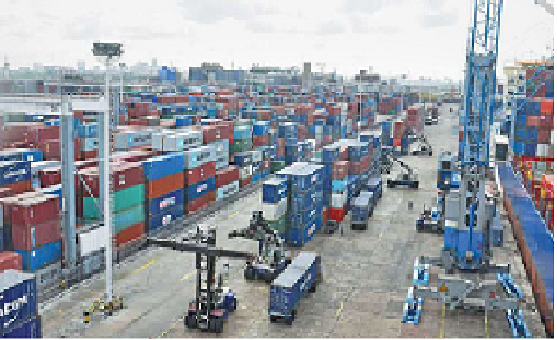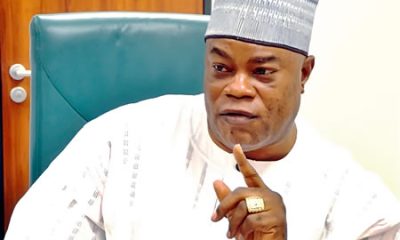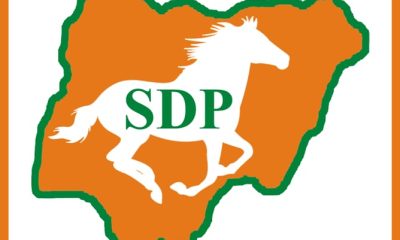BUSINESS
Stakeholder-Consultations Key to Maritime Sector Growth, Says Bello

From Anthony Nwachukwu, Lagos
Immediate past Executive Secretary/Chief Executive Officer of the
Nigerian Shippers’ Council (NSC), Mr. Hassan Bello, has charged heads
of all maritime regulatory agencies to unite and harness the immense
benefits of consulting sister-agencies and other stakeholders in
decision-making for better results.
Bello, who spoke in Lagos over the weekend during the NSC
long-service awards and his farewell party after eight years as head
of the agency, disclosed that the agency uses layers of consultation,
and has the most stakeholders in Nigeria.
He warned: “We cannot do without stakeholders because you will come
back to do it all over. Remove arrogance and ignorance and serve the
people, because that is what you are there to do. Unfortunately, some
of us in some institutions think they are there as the lords. No, it
is the stakeholders.”
Condemning the lack of cooperation among some of heads of maritime
agencies, Bello charged them to start the building block of unity
“because there is a lack of synergy. We have to operate on the basis
of equality because no agency is better than the other, all of us have
a role to play.”
According to him, “agencies are not graded by their budget but by
what they contribute. It is very unfortunate that some agencies think
that maritime starts and stops with them. No, it cannot be.
“Some agencies are all the time defending charities and that is not
good. They spend so much money defending charities and neglect what
they have to do. That is why we have problem, and that is what the
Nigerian Shippers’ Council will not take from anybody, not now, not
tomorrow, forever.”
He commended the Nigerian Maritime Administration and Safety Agency
(NIMASA) for heeding his call and promoting electronic documentation
for shipping companies, stating: “We are all equal and have
contributions to make; (we need) real, and not cosmetic cooperation.
“We must have the digitisation of our ports, otherwise we are
joking. I have seen the cooperation given by the shipping companies
and the terminal operators. We have to export or perish. Export is
another vista for trade facilitation that we have to look at and make
sure we translate to the economy.
“We are working together with the Nigeria Customs Service, and the
Central Bank of Nigeria, saving the economy. Why can’t I have
cooperation with a sister-company in my ministry?”
Relieved that the erroneous exclusion of the NSC from port
concession agreement is now over, he commended the Ministry of
Transportation for its intervention, stating that from inception, the
economic significance of the Shippers’ Council was never lost on the
government.
Therefore, its first chief executive officer was seconded from the
CBN, and another, a transporter who studied the economy of
transportation. According to him, “nothing contributes more to the
Gross Domestic Product of this country than shipping, and
transportation is key to the economy.
“What is wrong with us being in the concession agreement? You are
only party to that, why not democratise? Why won’t freight forwarders
have something to say on Lekki Deep Seaport? And now that the
Shippers’ Council is being invited to participate at looking at the
Lekki Deep Seaport in the quarterly meeting, that is good because we
bring ideas together.
“If Shippers’ Council’s idea on traffic was bought and executed,
there would never have been traffic on the Apapa Port road. So, I want
this to be taken into consideration that we need and must have genuine
collaboration.
“Shippers’ Council is the lead agency of the port manual and this
came because of its neutrality and professionalism, and this has to be
looked at. We cannot have an agency lording over us. An agency is as
good as its relationship with its ministry; you can’t be above your
ministry.”
BUSINESS
Electricity Supply Better off before Privatization – Consumers

Torough David, Abuja
Many electricity consumers in the Federal Capital Territory (FCT), said that electricity was more regular when it was being managed by the Federal Government.
The consumers, who reside in Kubwa, Kuje, Lugbe and Gwagwalada spoke in Abuja on Wednesday.
They said that the privatisation of the power sector was a good idea, but added that it was not working as they enjoyed more hours of supply when it was managed by Power Holding Company of Nigeria, (PHCN).
Privatization of the sector in November 2013, was an initiative of the Federal Government to transfer ownership and management of power assets to private entities.
The move was to improve efficiency, attract more investments, and enhance overall electricity supply.
Eleven Electricity Distribution Companies (DisCos) and six Generation Companies (GenCos) were formed after the sector was privatised.
However, the transmission arm of the sector was retained by the Federal Government.
The consumers said that electricity was more regular when it was managed by the government before privatisation of the sector.
Benjamin Okorie, a Civil Servant residing in Kubwa said that his area does not enjoy power supply for six hours in a day.
Okorie said that when PHCN was managing the power industry before the unbundling of the sector, it was stable and regular.
“I thought the unbundling of the sector into generation, transmission and distribution was to improve power supply.
“But from what we are experiencing now, it is getting worse by the day and we are paying more for electricity,’’ he said.
Maria Manza, a businesswoman also residing in Kubwa said that power supply was epileptic in her area.
Manza said that the area had been experiencing low shedding of power for more than three months, adding that some days they don’t even get supply.
Jonathan Onoja, resident in Lugbe, Federal Housing said that power supply was not regular in his area, adding that they hardly enjoy up to eight hours supply in a day.
According to him, with the privatisation of the power industry into three segments, I thought electricity will improve.
“With the privatisation of the power sector, I thought government was doing consumers a huge favour but to my greatest surprise electricity has not improved,’’ he said.
Julius Omogiafor, a businessman residing in Gwagwalada said that electricity was better off under government management.
Omogiafor said that when PHCN was in charge of power, it was more regular than when it is now managed by three bodies.
| ReplyReply allForwardAdd reaction |
BUSINESS
Small Business Owners Lament High Cost of Doing Business

Some business owners in the Federal capital Territory (FCT), have expressed concern over the high cost of doing business presently.
According to them, they are also experiencing low patronage as many residents can no longer pay for goods and services like before.
The business owners said on Wednesday in Abuja, that the cost of doing business was making life extremely difficult for them.
They said increased transportation, cost of living, inflation, and weakened purchasing power were some of the challenges affecting their businesses.
At the Apo Fish Market, Agnes Nwafor, a foodstuff dealer, said the current economic situation had dampened the usual weekend buzz.
“People who usually come to my shop to do bulk purchases no longer do that anymore. People now buy goods per time depending on their needs.
”So many others who come around enquire about the prices of the items and end up not picking anything,” she said.
Sani Abdul, a vegetable seller at the Apo market said he had cultivated the attitude of selling almost below his cost price just to turn-over and attract more customers.
He lamented that most of his customers now purchased things on credit paying up in two or three installments depending on the amount.
”With the low influx of customers to the market today, one will think that this is not even weekend.
“Some of my co-traders in the market sell a dust bin basket of tomatoes for between N10,000 and N12,000 but I sell for N9,500, just to attract customers.
“Most customers who come to the shop either want the price of the items slashed or want to buy the product on credit and I do not blame them,” he said.
He urged the government to come to the aid of citizens and find a lasting solution to the increasing cost of doing business in the country.
Ekaite Obong, who runs a restaurant at the Gudu market area, also decried high cost of doing business and poor sales.
Obong said:” it seems like the sales keep dropping every day, every week and every month. We are not making sales anymore due to high cost of products.
”Purchasing some food items now is like acquiring gold. Even items which the price ordinarily is supposed to decrease due to its season of cultivation have not declined.
“Thus, making the cost of food high, because we have infused a little profit to our sales. So I do not blame the customers who don’t turn out in mass at all.”
Obong urged the government to tackle inflation and strengthen the naira to reduce the cost of imported goods.
“We also need policies that help local farmers and producers too. If food items are affordable, cost of food will reduce and I am sure we will get more patronage,” she said.
Similarly, Chinedu Umeh, who runs a fabric store said the situation in the country had affected both his wholesale and retail business.
“The economy is biting hard, cost of transportation is killing our businesses. The government really needs to look into this area and find a lasting solution,” he said.
Umeh suggested tax relief for small businesses and better access to credit financing to help cushion the impact of reduced sales.
“Small businesses are the engine of the economy, but we are sinking. Government must listen to us, and come to our aid,” he said.
Owoicho Ameh, who owns a farm along airport road, also decried the high cost of doing business and low sales.
Ameh said: “it is no longer business as usual for us these days as the cost of chicken feed, electricity and even transport is challenging our business.
“We struggle with these factors even with our little resources, yet, at the point of sale, customers are either not willing or able to buy.
“This is because, when we factor in our cost of production, it leads to increased cost of the birds, making many customers not able to afford it.”
Ameh said on several occasions, he sold his birds at giveaway prices, just to make sales and get funds to take care of family responsibilities.
He lamented that if he continued in that manner, he may likely go out of business in the nearest future and become jobless.
“The government sincerely needs to take urgent steps to improve the economic climate, improve infrastructure and boost the people’s confidence.
“If this is not given immediate attention, the rate of suicides is bound to increase in the country and the number of jobless citizens will increase,” Ameh said.
BUSINESS
FG Inaugurates CNG Buses to Boost Staff Welfare

The Federal Government has reiterated its commitment to institutional performance and staff welfare with the inauguration of Compressed Natural Gas (CNG) buses at the Federal Ministry of Finance in Abuja
This was contained in a statement by the Director, Information and Public Relations of the ministry, Mohammed Manga.
Meanwhile, the Minister of Finance and Coordinating Minister of the Economy, Wale Edun, while inaugurating the buses, announced the reintroduction of essential provisions for the staff.
Edun described the move as part of a broader push to energise the ministry’s workforce and improve operational efficiency.
He said that the ministry’s internal strength was vital to delivering Nigeria’s broader economic reform agenda.
“This ministry is the engine room of national transformation and that engine must be well-fuelled,’’ he said.
He said that the buses were acquired under the presidential initiative on CNG, which intends to ease staff transportation while advancing the country’s shift to cleaner, cheaper energy sources.
The minister said that the initiative aligned with the ministry’s values of fiscal prudence, transparency and environmental responsibility.
Edun underscored the critical role of staff welfare in delivering Nigeria’s economic reform agenda.
He announced the revival of monthly welfare provisions to staff, a practical gesture aimed at fostering morale and stability as the ministry leads the charge on macroeconomic reform.
The Permanent Secretary of the Ministry, Lydia Jafiya, urged the staff to remain committed, disciplined and professional as the ministry continues to steer the country through a period of economic transition.
“As the country pursues tough but necessary policy shifts ranging from treasury digitalisation to market stabilisation, the ministry’s internal unity and external credibility remain pivotal to achieving inclusive growth and restoring investor confidence,” she said.
Jafiya also commended the minister’s leadership and hard work.
The Chairman of the Presidential Initiative on CNG, Ismaeel Ahmed, reiterated the programme’s mission to mainstream cleaner transport across government institutions and stimulate local industrial value chains.
| ReplyReply allForwardAdd reaction |





























